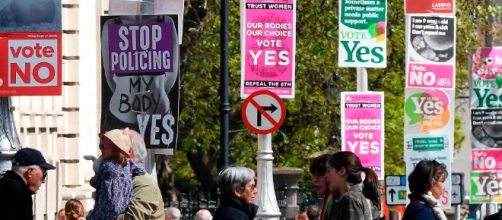Saturday night was a big night. Liverpool fans were disappointed by the Champions League final result and the Republic of Ireland held a referendum (on Friday) to decide whether or not the people wanted to repeal the Eighth Amendment of the Constitution of Ireland, which put a ban on women getting abortions. As it turns out, they do, since the result of the referendum was a pretty resounding 'yes'. 66.4% of the people voted to repeal in a landslide historical event that is being celebrated by winners throughout the UK – and especially in Northern Ireland which has always been more restrictive than the rest of the UK.
.
The amendment had formerly meant that women who wanted to get abortions would have to travel overseas in order to undergo the operations, but that presented all sorts of problems. For example, some of them could not afford to make the trip and would therefore be forced to have a baby that they also couldn’t afford to raise. Plus, you would have to get the time off work to travel over there. So, it was far from an ideal situation. Now, after all the passionate campaigning in the lead up to the referendum, the majority vote came in and they’ve decided to repeal the amendment, so that isn’t going to be a problem for Irish women anymore.
Only a single Irish constituency voted against repealing the eighth amendment in this referendum, which is a sign that times are changing in a momentous way.
With a voter turnout of 64.1%, the number of votes in favour of yes to repealing the amendment were double the amount of that in favour of keeping things the way they were. Now, the ban on abortion will be lifted by the Irish government in a groundbreaking historical event that nobody could’ve seen coming.
Constituency that voted against gay marriage voted to repeal the eighth amendment
The constituency Roscommon-Galway, which was the only one to vote against same-sex marriage when that referendum came around, was surprisingly not the one that voted against repealing this amendment in the Irish Constitution. In fact, its constituents voted in favour of repealing it with a majority vote of 57.2%.
The constituency that did not vote in favour of the repeal was actually Donegal. According to reports, this is due to the fact that a large amount of the “youth vote” in that constituency are actually registered to vote in other regions of the country.
Leo Varadkar, the Prime Minister (technically the Taoiseach, but that’s a complicated word that essentially means Prime Minister) of the Republic of Ireland, had been campaigning in favour of the repeal. Ecstatic about the vote for reform, he has said that the decision made in the referendum is “the culmination of a quiet revolution that’s been taking place in Ireland over the past twenty years.” He also said that the vote shows that the Irish people now “trust and respect women to make the right choices and decisions about their own healthcare.”
Yes campaigners call for it to be called ‘Savita’s law’
The people who campaigned day and night to educate Irish voters on the importance of women’s freedom to have abortions in anticipation of the referendum vote have celebrated their victory by calling for the new legislation to be called “Savita’s law,” in honour of Savita Halappanavar, who died in 2012 after being denied the right to terminate her pregnancy.
This call is coming officially from the group Together for Yes, which is a blanket group that represents all of the organisations that supported the pro-repeal movement.
Halappanavar became the face of the pro-repeal campaign when she died at age 31 and she is credited with the revolution that has led to this weekend’s referendum and its result. So, since she has always been the symbol of this movement, the officials in charge of it have decided that it would only be right to name the new law that would’ve prevented her death after her.



